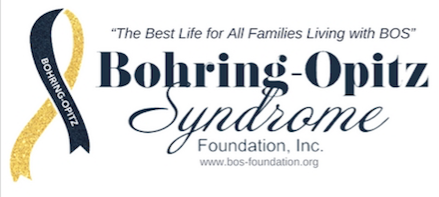Bohring-Opitz Syndrome Highlighted at ACMG
In March, the Bohring-Opitz Syndrome Foundation, Inc. made its debut at the American College of Medical Genetics and Genomes (ACMG) Annual Clinical Genetics Meeting in Phoenix, Arizona. The conference is considered the premiere educational and networking event in clinical genetics and genomics.
Carrie Hunsucker, Co-Founder and Chair, attended the conference along with Sandy Dreis, Board Advisor. They joined Dr. Bianca Russell, member of the Medical Advisory Board (MAB), in representing Bohring-Opitz Syndrome.
The Foundation sponsored a booth in the exhibition hall offering information on BOS, including the new Clinical Features document created under the direction of Dr. Russell and Dr. Wen-Hann Tan, also on the MAB. Carrie and Sandy met with several geneticists, and other professionals in the field, answering questions and engaging in discussions about BOS during the three-day conference.
Bohring-Opitz Syndrome was highly visible and garnered a lot of interest thanks to Dr. Russell. In the opening session she presented as part of the Cardinal Signs of Six Selected Syndromes session. She spoke on “Bohring-Opitz: Not a Subtype of C Syndrome Anymore!” This follows the recent discovery of the gene that causes Opitz C Syndrome by researchers from the Group on Human Molecular Genetics of the University of Barcelona and the Biomedical Research Networking Center of Rare Diseases (CIBERER).
Dr. Russell also presented a poster on “Bohring-Opitz Syndrome Patient Support Group an Essential Element for Optimizing Facial Dysmorphism Recognition Software Tool.” This was a project with the Face2Gene software tool educating and encouraging parents in the BOS support group to enter their child’s picture into the software tool to increase the likelihood for more accurate diagnoses.
Face2Gene is a tool that facilitates comprehensive and precise genetic evaluation through the use of an app that detects phenotypes and reveals relevant facial and non-facial features for genetic syndromes. We would like to thank the Facebook Group and the Bohring-Opitz worldwide exchange for their hard work in this project.
Carrie and Sandy both commented on how exciting it was to see so much attention surrounding Bohring-Opitz Syndrome.
During Dr. Russell’s opening session, the moderator asked how many in the audience had experience with BOS. Approximately twenty attendees raised their hands showing the growing awareness of the ultra-rare syndrome among the medical community.
There was a lot of buzz generated around BOS during the conference due to Dr. Russell’s talks and poster. It was promising to hear many geneticists mention they had cases at home where they would now consider BOS as a diagnosis.
It was an invaluable experience for the Foundation to network with others in the industry including diagnostic companies and other rare syndrome foundations.
“The discussion and learning around BOS created excitement for the attendees. Their enthusiasm led to hopefulness on our part that more and more children and families will receive the answers they need and deserve.” said Sandy.
Carrie mentioned one of the important takeaways from the week is the need to raise awareness among geneticists that they can test for a custom panel if they suspect BOS. She was also able to confirm the ASXL1, 2, and 3 mutations were on the panels at the attending diagnostic companies.
Networking with successful rare syndrome foundations was also beneficial to form future mentorships to grow the BOS Foundation. Having a strong community of parent and family advocates is key to success in any patient run organization.
“I think it’s important for geneticists and researchers to see what an engaged and motivated group of parents and families are behind them,” noted Carrie.
A highlight from the week was a fellow geneticist approaching Dr. Russell about including pictures and description on BOS in an up-coming book on genetics in the newborn period. This is an exciting step to further the education of those in the medical community to ensure earlier diagnosis of BOS.
The Foundation would like to thank Dr. Bianca Russell for her hard work and dedication to the BOS community.

